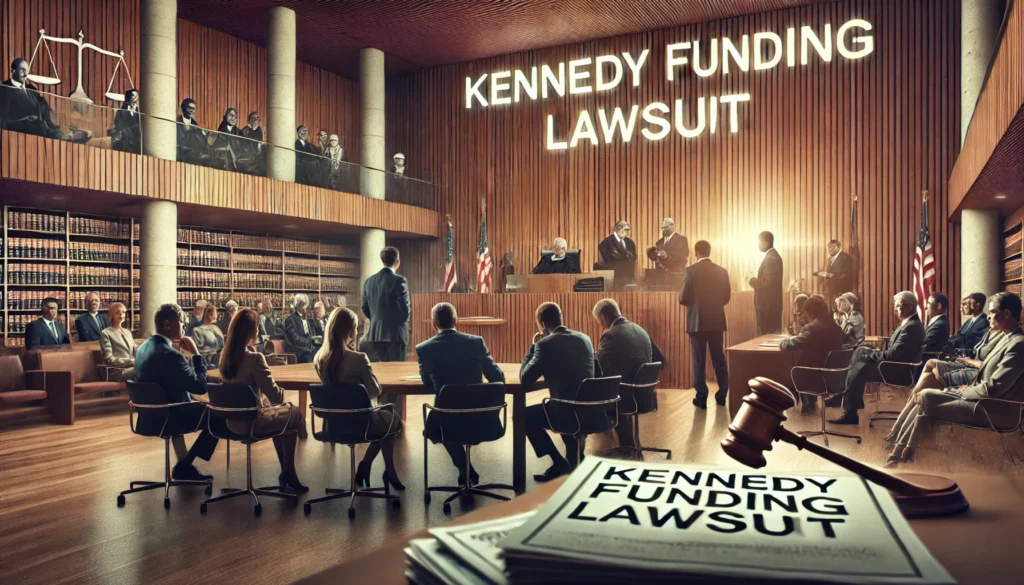kennedy funding lawsuit is a commercial real estate lending company based in New Jersey. Established in the early 1980s, it has been a key player in the finance industry by providing bridge loans, which are short-term loans meant to bridge the gap between a company’s current needs and long-term financing. kennedy funding lawsuit specializes in offering quick, flexible loans often required by businesses in urgent financial situations. While they offer services across various industries, their main target includes real estate developers, small businesses, and individual investors.
Table of Contents
For years, kennedy funding lawsuit built a reputation as a trusted lender, capable of approving and disbursing loans faster than traditional banks. However, their rapid approval process and flexibility raised questions about transparency and ethical practices in their lending procedures, leading to increased scrutiny from regulatory bodies and industry experts.
The Origin of the Kennedy Funding Lawsuit
The Kennedy Funding lawsuit began as a result of disputes over several loan agreements that clients felt were unfair, misleading, and deceptive. One of the most prominent cases involved Virgil Shelton, who became the primary plaintiff in the lawsuit after an incident concerning a loan related to the Rest in Peace Cemetery in Arkansas. Shelton claimed that Kennedy Funding did not adhere to the loan agreement, causing him to suffer substantial financial losses.
Other cases against Kennedy Funding emerged, with several borrowers alleging that the company’s loan terms were not clearly communicated or that they had been misled about essential details, such as interest rates and repayment schedules. These complaints led to a wave of lawsuits and ultimately escalated to a high-stakes legal battle that brought Kennedy Funding’s practices under intense scrutiny.
Key Issues and Allegations Against Kennedy Funding
One of the main issues in the Kennedy Funding lawsuit was the breach of contract claims brought by borrowers. Clients, including Virgil Shelton, argued that Kennedy Funding did not uphold the agreed-upon loan terms. In Shelton’s case, he claimed that Kennedy Funding withheld payments despite an agreement, which left him in a difficult financial situation.This breach of contract meant that Kennedy Funding failed to honor its legal obligations and agreements made with borrowers.
Such breaches impacted the borrowers’ ability to make financial decisions, forcing them into unforeseen debt and losses. This lawsuit highlighted the importance of clear loan agreements and the need for lenders to be transparent and honest when entering contracts with clients.
Fraud and Misrepresentation AllegationsThe lawsuit also centered on allegations of fraud and misrepresentation by Kennedy Funding. Borrowers claimed that the company misrepresented key details about their loans, such as interest rates, property values, and repayment terms. For example, borrowers stated that they were given inaccurate information about the loans, which led them to take on more debt than expected.
These allegations suggest that Kennedy Funding may have intentionally provided false or incomplete information to lure clients into agreements. Misrepresentation in such cases is considered serious, as it implies that borrowers were deceived into entering unfavorable loan agreements that could harm their financial stability.
Predatory Lending PracticesThe plaintiffs accused Kennedy Funding of engaging in predatory lending practices, which means they claimed the company imposed unfair and abusive loan terms designed to trap borrowers in long-term debt. Examples of these practices included hidden fees, high-interest rates, and penalties for late payments that were not disclosed upfront. Predatory lending often targets borrowers who may not fully understand the terms, making them vulnerable to exploitation.
This aspect of the lawsuit has raised concerns about ethical lending and has prompted discussions about regulating the industry to protect borrowers from such harmful practices. Predatory lending is a severe offense because it can have devastating effects on individuals and businesses, pushing them into unmanageable debt.
The Court Proceedings and Key Rulings
The Kennedy Funding lawsuit involved extensive examination of evidence, where both parties presented their legal arguments to support their claims. The evidence included contractual documents, correspondence between the parties, financial statements, and expert testimonies. These pieces of evidence were crucial in demonstrating whether Kennedy Funding adhered to legal and financial norms or engaged in deceptive practices.
Legal experts dissected the loan agreements to determine if Kennedy Funding’s practices aligned with industry standards. The complexity of the case required the courts to carefully evaluate all evidence presented to establish the validity of the claims made by both sides.
Significant Verdicts and AppealsOne of the most significant verdicts in the lawsuit was when the jury initially awarded Virgil Shelton $1.675 million for breach of contract and fraud claims. However, this amount was later reduced to $675,000 on appeal, indicating that while Shelton’s claims were valid, the court adjusted the compensation Kennedy Funding had to pay.
The rulings not only impacted Shelton but also set a legal precedent for how such cases might be treated in the future. The appeals process demonstrated that legal battles can be complex, with outcomes potentially changing as the case progresses through various levels of the judicial system.
Recent Developments and Current StatusAs of now, the lawsuit continues to move through the legal system, with settlement discussions and mediation efforts being explored. Both parties have shown interest in potentially avoiding a lengthy trial by reaching a mutually agreeable resolution. However, if no settlement is reached, the case is expected to proceed to a full trial, which could further complicate the resolution.
Impact and Implications of the Kennedy Funding Lawsuit
How the Lawsuit Affects Kennedy Funding’s Operations and ReputationThe lawsuit has had a significant impact on Kennedy Funding’s operations and reputation. The company has had to allocate substantial resources for legal defense, diverting funds away from other business activities. Additionally, the ongoing litigation has raised questions about Kennedy Funding’s business practices, which may impact its relationship with potential clients.
Reputation is crucial for lenders, and accusations of fraud or breach of contract can tarnish their image, making it challenging to regain trust. As a result, Kennedy Funding may need to overhaul its internal policies and practices to prevent future legal issues and rebuild its credibility.
Industry-Wide Effects and Regulatory ChangesThe Kennedy Funding lawsuit has prompted increased discussions about regulatory changes and the need for transparency in the lending industry. Financial institutions may face stricter oversight, compliance requirements, and regulations to protect borrowers from similar incidents. This case could lead to industry-wide reforms designed to ensure fair lending practices, ultimately benefitting both borrowers and lenders.
Public Confidence and Investor TrustThe lawsuit has affected public confidence in the real estate financing sector, raising questions about the ethical practices of lenders. Investors may be more cautious about engaging with lenders, prioritizing companies that demonstrate transparency and ethical behavior. Maintaining investor trust is essential, as it directly influences the health and growth of the industry.
Broader Lessons Learned from the Kennedy Funding Lawsuit
Importance of Transparency and Ethical Conduct in LendingOne of the biggest lessons from the Kennedy Funding lawsuit is the critical need for transparency and ethical conduct in lending. Borrowers depend on accurate information to make informed financial decisions. This case serves as a reminder that lenders must be honest and clear about loan terms to maintain trust and avoid legal challenges.
Understanding Loan Agreements and Contractual ObligationsFor borrowers, understanding the terms and conditions of a loan agreement is essential. It’s crucial to thoroughly review and seek legal advice before entering any financial agreement. Clear communication and documentation help protect both lenders and borrowers from future disputes and misunderstandings.
Regulatory Considerations and the Need for Reform
The Kennedy Funding lawsuit highlighted the importance of regulatory oversight in the lending industry. The case may lead to legislative changes, ensuring that financial transactions are transparent and fair for all parties involved. Such reforms are necessary to prevent predatory practices and safeguard consumers’ interests.
Future Outlook for Kennedy Funding and the Lending Industry
Potential Resolutions and Settlement ScenariosThe Kennedy Funding lawsuit could conclude with a settlement between both parties, where Kennedy Funding might agree to compensate the plaintiff to avoid further litigation. Alternatively, if no settlement is reached, the case will proceed to a full trial, where a judge or jury will determine the final outcome.
Long-Term Effects on Lending Industry StandardsThe outcome of this lawsuit will likely influence the lending industry standards for years to come. Lenders may adopt stricter guidelines and best practices to ensure that they operate transparently and ethically, avoiding legal challenges. This shift will ultimately foster a more trustworthy and fair lending environment for all parties involved.
Expert Opinions and PredictionsLegal experts believe that this lawsuit could set important precedents in the lending industry, shaping how contractual disputes are handled in the future. Financial analysts suggest that this case serves as a cautionary tale for lenders, emphasizing the need for due diligence and transparency in all financial dealings.
Conclusion
Recap of Key TakeawaysThe Kennedy Funding lawsuit highlights the importance of transparency, ethical conduct, and clear loan agreements in the lending industry. The case has brought attention to issues like breach of contract, fraud, and predatory lending, serving as a wake-up call for lenders to operate with integrity.
The Broader Significance for Borrowers, Lenders, and InvestorsThis lawsuit emphasizes the need for vigilance when entering financial agreements. Borrowers must ensure they understand loan terms, while lenders should prioritize fair practices. The case also serves as a reminder for investors to support ethical financial institutions.
Final Thoughts on the Future of Real Estate FinancingThe Kennedy Funding lawsuit has the potential to reshape the future of real estate financing, encouraging more ethical lending practices and regulatory oversight. As the industry evolves, maintaining trust and transparency will be crucial in fostering a healthy, sustainable financial landscape.
Read More:Brett Nardini







